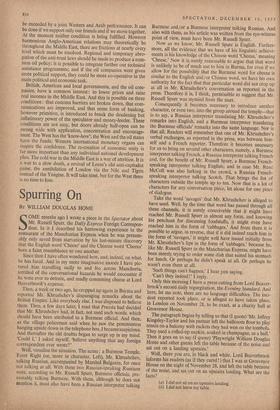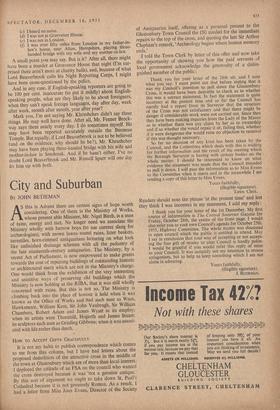Spurring On
By WILLIAM DOUGLAS HOME SOME months ago I wrote a piece in the Spectator about Mr. Russell Spurr. the Daily Express Foreign Correspon- dent. In it I described his harrowing experience in the restaurant of the Manchurian Express when he was presum- ably only saved from starvation by his last-minute discovery that the English word 'Cheese' and the Chinese word `Cheesu' bore a faint, resemblance to one another.
Since then I have often wondered how, and, indeed, on what, he has fared. And in my more imaginative moods 1 have pic- tured .him travelling sadly to and fro across Manchuria, terrified of the conversational hazards he would encounter if he were ever to detrain, and madly consuming cheese at Lord l3eaverbrook's expense.
Then, a week or two ago, he cropped tip again in Burma and reported Mr. Khrushchev's disparaging remarks about the British Empire. Like everybody else, I .was disposed to believe them. Then, a few days later. I read that Pravda had decided that Mr. Khrushchev had, in fact, not used such words, which should have been attributed to a Burmese official. And then, as the village policeman said when he saw the postmistress hanging upside down in the telephone box, I became suspicious. And thereafter the old doubts began to surge up in my mind. `Could I,' I asked myself, 'believe anything that any foreign correspondent ever wrote?'
Well, visualise the situation. The scene: a Burmese Temple. Enter Right (or, more in character, Left),. Mr. Khrushchev, talking Russian. accompanied by Marshal Bulganin, for once not talking at all. With these two Russian-speaking Russians were, according to Mr. Russell Spurr, Burmese officials, pre- • sumably talking Burmese. With them, although he does not mention it. must also have been a Russian interpreter talking Burmese and/or a Burmese interpreter talking Russian. And also with them, as his article was written from the eye-witness point of view. must have been Mr. Russell Spurr.
Now as we know, Mr. Russell Spurr is English. Further- more, all the evidence that we have of his linguistic achieve- ments is his knowledge of the Chinese word `Cheesu,' meaning `Cheese.' Now it is surely reasonable to argue that that word is unlikely to be of much use to him in Burma, for even if we allow for the possibility that the Burmese word for cheese is similar to the English and/or Chinese word, we have his own authority for the fact that that particular word did not crop up at all in Mr. Khrushchev's conversation as reported in the press. Therefore it is, I think, permissible to suggest that Mr. Russell Spurr was stymied from the start.
Consequently it becomes necessary to introduce another character, or even two, into the group around the temple—that is to say, a Russian interpreter translating. Mr. Khrushchev's remarks into English, and a Burmese interpreter translating the Burmese officials' remarks into the same language. Nor is that all. Readers will remember that one of Mr. Khrushchev's verbal exchanges, as reported in the press, was between him- self and a French reporter. Therefore it becomes necessary for us to bring on several other characters, namely, a Burmese interpreter talking French, a Russian interpreter talking French and, for the benefit of Mr. Russell Spurr, a Burmese French- speaking interpreter talking English; and in case Mr. Ren6 McColl was also lurking in the crowd, a Russian French- speaking interpreter talking Scotch. That brings the list of characters outside the temple up to ten. Now that is a lot of characters for any conversation piece, let alone for one piece of dialogue.
Take the word 'savages' that Mr. Khrushchev is alleged to have used. Well, by the time that word has passed through all these channels, it is surely conceivable that it might have reached Mr. Russell Spurr in almost any form, and knowing his penchant for discussing foodstuffs, it might even have reached him in the form of 'cabbages.' And from there it is possible to argue, in reverse, that if it did indeed reach him in the form of !savages,' it might well have issued initially from Mr. Khrushchev's lips in the form of 'cabbages,' because he, like Mr. Russell Spurr in the Manchurian Express, might have been merely trying to order some dish that suited his stomach for lunch. Or perhaps he didn't speak at all. Or perhaps he wasn't even there at all `Such things can't happen,' I hear you saying.
`Can't they indeed!' I reply.
Only this morning I have a press cutting from Lord Beaver- brook's second daily regurgitation, the Evening Standard. And here, let me note, there are no language difficulties. The inci- dent reported took place, or is alleged to have taken place. in London on November 28, to be exact, at a charity ball at Grosvenor House.
The paragraph begins by telling us that (I quote) 'Mr. Jeffrey Kingsley-Taylor and his partner left the ballroom floor to play tennis on a balcony with rackets they had won on the tombola. They used a rolled-up napkin, soaked in champagne, as a ball.' Then it goes on to say (I quote) 'Playwright William Douglas Home and other guests left the table because of the noise and sat out on a landing upstairs.'
Well, there you are, in black and white. Lord Beaverbrook informs his readers (as if they cared !) that I was at Grosvenor House on the night of November 28, and left the table because of the noise, and sat out on an upstairs landing. What are the facts?
(a) I did not sit on an upstairs landing.
(b) 1did not leave my table.
(c) I heard no noise.
(d) I was not at Grosvenor House.
(e) I was not in London.
(f) I was over fifty miles from London in my father-in- law's home, near Alton, Hampshire, playing three- handed bridge with my wife and my mother-in-law.
A small point you may say. But is it? After all, there might have been a murder at Grosvenor House that night (1'm sur- prised there aren't more at charity balls), and, because of what Lord Beaverbrook calls his Night Reporting Corps, I might have been cross-questioned by the police.
And in any case, if English-speaking reporters are going to be 100 per cent. inaccurate (to put it mildly) about English- speaking people, what are they likely to be about foreigners, when they can't speak foreign languages, day after day, week after week, month after month, year after year?
Mark you, I'm not saying Mr. Khrushchev didn't say these things. He may well have done. After all, Mr. Fenner Brock- way says them nearly every day. I do sometimes myself. He may have been reported accurately outside the' Burmese Temple. But equally, if Lord Beaverbrook is not to be believed (and on the evidence, why should he be?), Mr. Khrushchev may have been playing three-handed bridge with his wife and mother-in-law in Smolensk. And if he hasn't either, I've no doubt Lord Beaverbrook and Mr. Russell Spurr will one day fix him up with poll,.



































 Previous page
Previous page